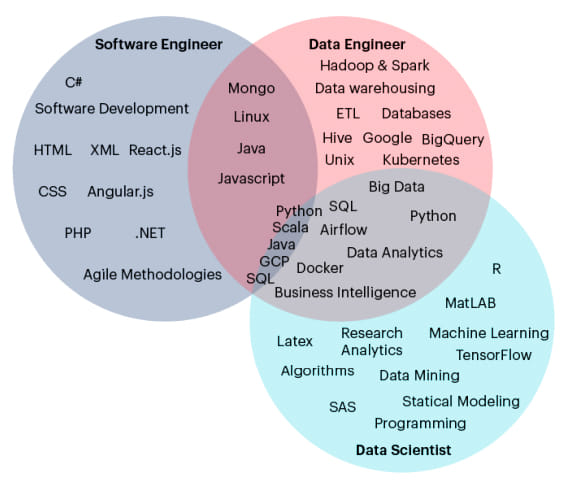Shifting from a career in software development to data engineering? Here are some tips
Reading Time: 4 minutes

The role of a data engineer has gained prominence and sparked curiosity about the data engineer career path and the possibilities it holds. With the rapid expansion of technology and the emergence of data as the lifeblood of modern enterprises, the question on many minds is,Is data engineering a good career choice?
According to research, data engineering interviews increased by 40% in the past year. This makes sense in a world that is navigating through a pandemic by rapid digital transformation. As more data is produced and consumed, businesses increasingly require experts who can manage large amounts of customer information, product performance results, and competitor research. Naturally, a data engineering career has become one of the most promising career options right now.
Software Development vs. Data Engineering
In the current technological landscape, most of modern computing has to do with cloud computing — where businesses leverage the cloud, rather than storing all their data on local servers. Cloud computing has simplified and streamlined how most organizations perform business processes, offering faster collaboration and real-time data management. Almost everyone — software developers and data engineers alike — utilize many of the tools stored in the cloud, and this is partially why the two fields overlap.
In fact, both fields may even sound interchangeable to the everyday person. After all, both rely heavily on programming and have similar skill sets. However, the way they use these skills differs greatly and influences data engineer vs software engineer career growth. Software developers code to build and manage the increasingly complex products we use to navigate the cloud, and these skills are taught at all levels of higher education from bachelor’s to master’s degrees. Professionals with software development master’s credentials focus on the creation, architecture, and presentation of software and applications. They build applications, create virtual reality platforms but only engage with data infrastructure in a limited capacity.
Software developers are mostly concerned with broad strokes and a “macro” approach to data. They are responsible for building infrastructures like large-scale applications, platforms, and systems. They also implement program codes to make these scalable systems function more efficiently. They’re less concerned with cloud data warehouses or querying data, preferring to keep things upfront for a much simpler process.
On the other hand, data engineers maintain large datasets by building structures that house them. A data engineer stores, consolidates, and retrieves data so that accurate information is available to end-users — like software developers building systems and apps — which enable them to make crucial decisions. By building data infrastructures, data engineers play a critical role in enabling digital transformation associated with artificial intelligence (AI) and machine learning (ML) initiatives.

(Adapted from www.ryanswanstrom.com)
Data engineering is a specific skill that emerged from software engineering. However, a regular software engineer cannot be asked to perform the role of a data engineer because there are distinct activities and processes central to data engineering. For example, data engineers focus on the “micro” aspects of data science and analytics. Data engineers would also be more familiar with handling Big Data, which are often complex data sets. Data engineers would have to build massive data reservoirs such as data lakes that have highly scalable and fault-tolerant distributed systems.
Tips on Shifting to Data Engineering
Shifting from software development to a career in data engineering is not uncommon, especially since developers already have a background in programming languages. However, to excel as a data engineer, you need to develop the ability to collect, query, and store information from databases. Here are three tips to help you shift to data engineering:
Improve your communication skills: Data engineers have to collaborate with colleagues who may not have technical expertise, so being able to communicate your thoughts clearly and without relying heavily on jargon is a must. Having strong communication skills ensures that you design and implement systems that are accessible to others.
Develop an “eye” for finding patterns: If you don’t love, or (at the very least) have an interest in data, you’re going to have a difficult time. A data engineer needs to enjoy finding patterns, identify new ways to create complex systems that work, and keep the big picture in mind.
Keep up to date with trends: As data science is a dynamic field, data engineers must constantly upskill so they can work well with data scientists, analysts, and architects. Trends in concepts and technologies related to AI/ML for automating processes, tools that can keep data management affordable, and data privacy compliance are just some of the things data engineers should be familiar with. You may also need to unlearn old skills; some coding languages like Python are still important, but it’s more critical to develop your skills in machine learning, algorithm design, and domain knowledge. With technology changing faster than ever, data engineers must be quick in adopting new tools.
For data engineering services that help you build and streamline your data processing pipeline for more value, talk to our team at Sigmoid today.
Featured blogs
Subscribe to get latest insights
Talk to our experts
Get the best ROI with Sigmoid’s services in data engineering and AI
Featured blogs
Talk to our experts
Get the best ROI with Sigmoid’s services in data engineering and AI







